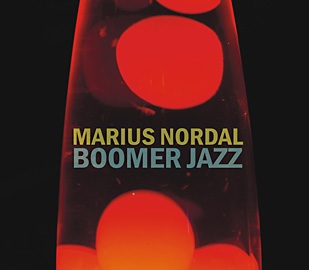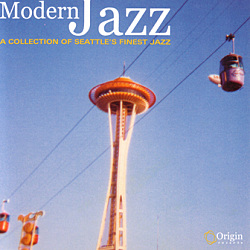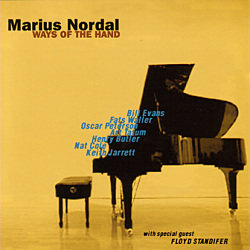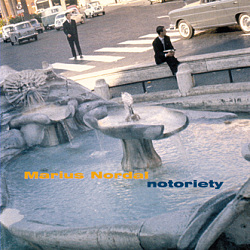
This is mature music of the highest intelligence and emotional power and can be deeply enjoyed by anyone willing to really listen.
Marius Nordal is an unusual musician of many parts. Many know him as "Butch" Nordal, the big band writer who wrote iconic pieces such as "Suncatchers" and "Liferaft Earth." Others know his work as a witty, somewhat cutting journalist who has interviewed luminaries such as Keith Jarrett, Chick Corea and Branford Marsalis. Then there is Nordal the amazing jazz pianist whose recent releases on the Origin label have delighted serious jazz fans around the world. Finally, there is his work as an educator. He taught college for 25 years and can now be seen in over 40 videos on YouTube covering a variety of jazz topics rarely touched upon by others.
Marius Nordal grew up in Seattle after moving there from New Orleans at the age of seven. After several years of piano lessons he became an accomplished boogie woogie and blues player and started playing in public at age 13. "My little debut created quite a stir because rock 'n' roll was brand new to white America and hard-driving blues was seen as a moral issue by middle class parents...that's hard to understand today."
"During my high school years," Nordal continues, "I grew up during the last few years of an eclectic, bluesy era where Miles Davis, Count Basie, Fats Domino, Chuck Berry and Bill Doggett co-existed with Doris Day, Pat Boone, Perry Como and Frank Sinatra. You could even hear any of them on a single radio station! At that time, elegant, black-tie celebrities like Cary Grant, Fred Astaire and Grace Kelly were being replaced with brooding, leather-jacketed rebels like Marlon Brando, James Dean, Miles Davis and Elvis Presley. It was a threatening time for suburbia everywhere...I loved it! It seemed that some of New Orleans' subculture funkiness had followed me north."
At age 19, Nordal attended the Oscar Peterson school in Toronto and had his career split between playing B-3 Hammond organ gigs in blues clubs and working jazz jobs, mostly with musicians one generation older. "For several years during these turbulent times, until I was about 25, I worked in a remarkable seven piece horn group called 'The Pacific Northwest Territory Band', "Nordal continues. "We worked about 200 gigs a year and I wrote countless arrangements. It was remarkable because the band played every kind of music that existed...we had a sound guy and a road manager and we never had subs..."
It was during this period of totally unfettered social and musical freedom that Nordal changed from being a pianist to a writer. "Listeners wanted their minds blown during those crazy times," he says, "and I was actually paid to develop and write new stuff that would, hopefully, put people in a state of ecstasy!" Nordal left Seattle at age 25 as a mature musician to study composition at North Texas State University.
"When I arrived in Texas, there were 1200 music majors. A few years later when I left, there were 2000!...there was a world class student orchestra, opera company and 12 big bands too. There were a lot of geniuses there that had talent that can never be explained. It was my first contact with big talent that required little or no practice to develop...except, in this case, everybody worked very hard too! It was a place in which you could transcend yourself. Everybody had their stories where, after a couple of years, people in their hometown barely recognized them anymore."
During this time, Nordal's most satisfying and productive writing was found in his big band pieces of the 1970s, many of which are still the most demanding, adventuresome and well known works of the entire era. He has a very organized, edgy, yet classical, music sensibility that had been irradiated with his blues band experiences and forged in an emotionally charged era. This resulted in such notable pieces as "Liferaft Earth," "Fancy," "Suncatchers," "Oregon" and his still amazing arrangements of "Moon River" and "Blues and The Abstract Truth."
"I wrote about 35 major big band charts during that period. I published them through my own company and a few through C.L. Barnhouse Co." Nordal says. "Things took off like a rocket and I could barely keep up. I evidently wrote with authority of the older generation of writers but, in my youthful state, wrote stuff that reflected the times too. There was no competition because the real geniuses like Thad Jones hadn't even started publishing their arrangements yet!...there were a lot of bootleg big band pieces around, but they were pretty much just record copies of ancient stuff by Basie, Kenton and Woody Herman."
Nordal moved back to Seattle to teach college in mid-1970s and spent the next 10 years dividing his time between teaching, writing, managing his successful music publishing company, doing festival appearances and playing the piano. He had been able to take advantage of the brief resurgence of big bands in the 1970s when they again enjoyed a few moments as a creative force in the jazz world.
"Some outstanding jobs had come my way before I moved back to Seattle," Nordal says, "but they all involved a choice between either a great lifestyle or a career. Washington is an ecological and intellectual paradise and currently quite the center of new jazz talent and recordings...I've never regretted being in Seattle."
By the mid-1980's, Nordal had stopped band writing and returned to playing in public and writing non-jazz pieces for saxophone, marimba and piano. During this time he kept in various activities in separate "boxes."
After about a decade of creative "rest," which was occupied by just teaching college and playing 100 jobs a year, Nordal began his current string of piano recordings in 1998 with his first release, "Notoriety," followed by "Ways of The Hand" and followed with "Boomer Jazz" in late 2009.
One striking feature of these piano recordings, aside from a complete command of the keyboard, is the unusual musical clarity and sense of purpose with which he speaks.
"Hey, I wasn't really a keyboard guy," he explains. "I was a paper and pencil composer who spent years researching and conjuring up ideas and musical solutions. When I eventually came back to piano in recent years, I found that I had stopped just quoting licks and scales and was playing some real ideas. By physically abandoning the piano to write, my fingers lost their prejudices because I was really hearing things."
Speaking of the last few years and the future, Nordal says "I built a new house, my daughter was born in 1998, I retired from college teaching in 2001, I did some fairly serious jazz journalism and released three recordings, all in about ten years," Nordal says, "all in all, I'm happy with that."
Nordal is currently working on a new recording of piano music by the Russian genius Nikolai Kapustin and writing a book on pentatonic scale concepts.
RECORDINGS FEATURING Marius Nordal
ARTIST WEBSITE:
For more information about Marius Nordal, please visit: http://http://mariusnordal.com/.
ARTIST VIDEO:
Explore other Pianists:
Clay Giberson
Marc Seales
Pax Wallace
Randy Halberstadt
Ryan Burns
Bill Anschell
Jessica Williams
Glenn Zaleski
Geoffrey Keezer
Toby Koenigsberg
Laurence Hobgood
Geoff Stradling
Hal Galper
Darrell Grant
Jim McNeely
Ron Di Salvio
Kelly Brand
Dawn Clement
Steve Million
John Hansen
Jon Alberts
Bram Weijters
Paul Hofmann
Richard Sussman
Michal Vanoucek
Matija Dedic
Alex Chadsey
Stu Katz
Brittany Anjou
Ryan Cohan
Ron Perrillo
Gary Versace
Darin Clendenin
Dan Cray
Dick Reynolds
Ted Brancato
George Colligan
Dominic J. Marshall
Jerry Heldman
Gene Argel
Josh Nelson
Michael Orenstein
Richie Beirach
Jack Perla
Florian Hoefner
Oscar Hernández
Bongwool Lee
Orrin Evans
Alain Mallet
Joachim Mencel
Sean Michael Giddings
Phillip Strange
Jim Ridl
Dylan Hayes
Bruce Barth
Rick Roe
Adam Benjamin
Keigo Hirakawa
Pamela York
Gabriel Guerrero
Chuck Owen
Fabian Almazan
Danny Grissett
Dave Hanson
José Luiz Martins
Milan Verbist
Jovino Santos Neto
Bill Mays




